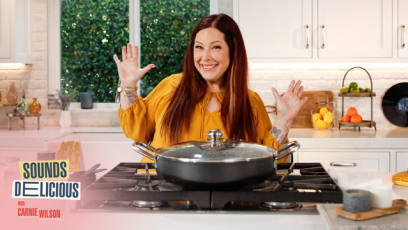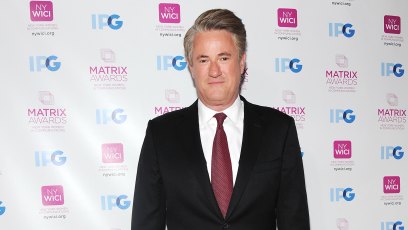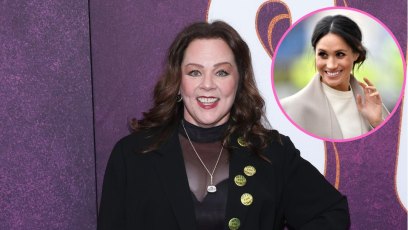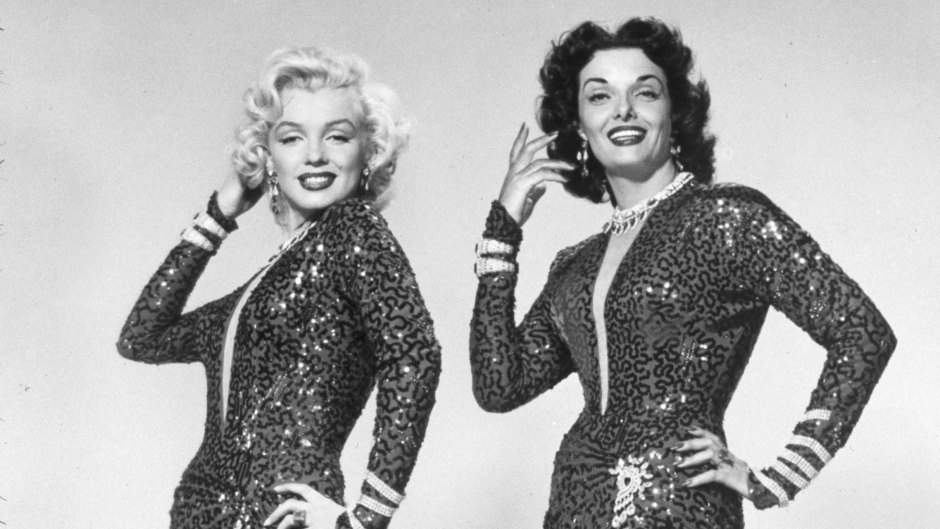
Snap/Shutterstock
Jane Russell Never Felt ‘Threatened’ by ‘Gentlemen Prefer Blondes’ Costar Marilyn Monroe
In Gentlemen Prefer Blondes, Marilyn Monroe and Jane Russell play mismatched best friends. Marilyn’s Lorelei Lee is a platinum blonde, babyvoiced gold digger hungry to marry a rich man, while Jane Russell’s brunette Dorothy Shaw is wise and witty, but has a profound weakness for handsome men. Despite their opposite appearances and attitudes about love, these sirens remain loyal to each other until the musical’s final frame.
Marilyn and Jane also developed a warm relationship while filming the 1953 hit. They shared a strong work ethic and bonded over the ways their personal histories overlapped. “She was like a little sister,” said Jane, who called her costar “Baby Doll” and “Blondie” on the set. “[Marilyn was] very shy and very sweet and far more intelligent than people gave her credit for.”
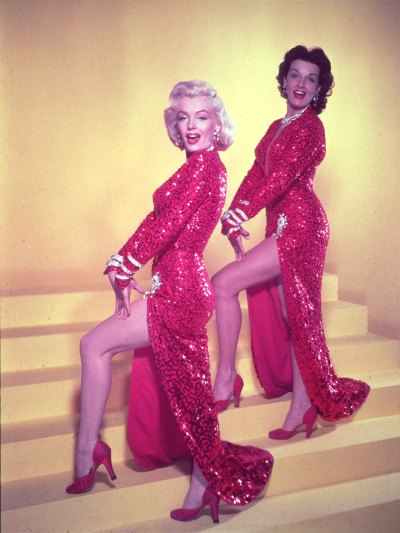
The set of Gentlemen Prefer Blondes wasn’t the first time they’d met. “Marilyn’s first husband, Jim, went to high school with me,” said Jane, who was in drama club with James Dougherty, Marilyn’s spouse from 1942 to 1946.
“One day he came by and said, ‘I want you to meet my wife.’” It was Marilyn, then a brunette known by her birth name, Norma Jeane. “She was a pretty girl,” recalled Jane.
Gentlemen’s choreographer, Jack Cole, understood that neither Jane nor Marilyn was a professional dancer. “He developed dance routines that really complemented each of their styles,” Christina Rice, author of Mean…Moody…Magnificent!: Jane Russell and the Marketing of a Hollywood Legend, tells Closer. “Jane was instantly impressed with just how hard Marilyn worked. Jane worked hard, too — but at the end of the day, she went home to her husband and family while Marilyn would stick around rehearsing.”
At the time, Jane was the bigger star. She earned $200,000 for Gentlemen while Marilyn, who didn’t even rate her own dressing room at the start of shooting, earned just $500 a week. “But that was, to me, considerable,” recalled Marilyn, who eventually summoned up the courage to demand a trailer. “They always kept saying, ‘Remember, you’re not a star.’ I said, ‘Well, whatever I am, I am the blonde … and it is Gentlemen Prefer Blondes.’”
Jane also supported her younger costar — especially once filming began and she realized that Marilyn was terrified. “It was only her second starring role,” said Jane. “She’d be so frightened with nerves she’d sit trembling in her dressing room.” After Marilyn was late to the set, Jane got in the habit of knocking on her costar’s door. “I’d say, ‘Come on, Baby, let’s go,’ and we’d trot off together,” she remembered.
Another woman might have viewed Marilyn as a rival, but Jane saw her as a friend. “Jane was pretty grounded, self-possessed, and very comfortable in her own skin. She was never threatened by Marilyn,” says Rice, who adds that the older star felt very empathic about Marilyn’s difficult life. Said Jane: “She never knew her father, her mother was in a mental institution, and Marilyn had been in foster care. I think she’d had some terrible experiences, and she wanted to get away from her background.”
She tried to help by inviting Marilyn to Hollywood Christian Group, a Bible study that met at Jane’s home. “Religion was something they had in common,” says Rice. Marilyn’s foster family had been Baptist, while her mother had followed Christian Science. “Jane felt that Marilyn needed to be saved,” she adds. Although Marilyn did attend one meeting, it wasn’t for her. “Jane tried to convert me,” she said years later, “and I tried to introduce her to Freud.”
The celebrity press, meanwhile, tried inventing a rivalry between the costars, but Jane and Marilyn put a stop to it. “Both of them were like, ‘Come on, we are not doing that,’” says Rice. “They were quick to prop each other up, and they combatted those kinds of stories from the start.”
Gentlemen Prefer Blondes premiered in July 1953 and was an immediate hit. “Both Jane Russell and Marilyn Monroe are nothing short of sensational,” gushed one trade review. After so many years of hard work, the film finally gave Marilyn the success and recognition she longed for. “The people made me a star,” she later recalled. “No studio, no person [decided that], but the people did.”
Sadly, although time would never dull their affection for each other, Marilyn and Jane only kept in sporadic contact after Gentlemen wrapped. “We considered ourselves friends, but Marilyn kind of went from one group to another,” explained Jane, who nonetheless sent her pal a sweet letter after Marilyn’s second divorce.
Jane also wrote in her memoir, My Path and My Detours, that Marilyn had been on her mind during a girls’ weekend she had with friends just before hearing of Marilyn’s death. “We philosophized, laughed at our problems, and giggled,” she wrote. “I wished I had [Marilyn’s] phone number because I knew she belonged there, where we were all laughing about our problems.”














